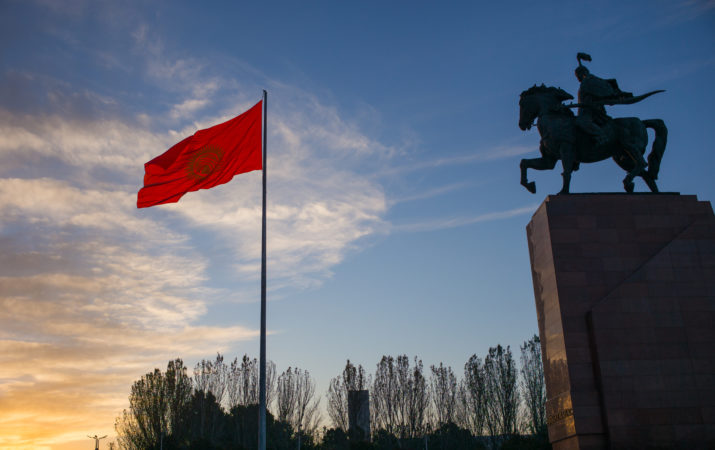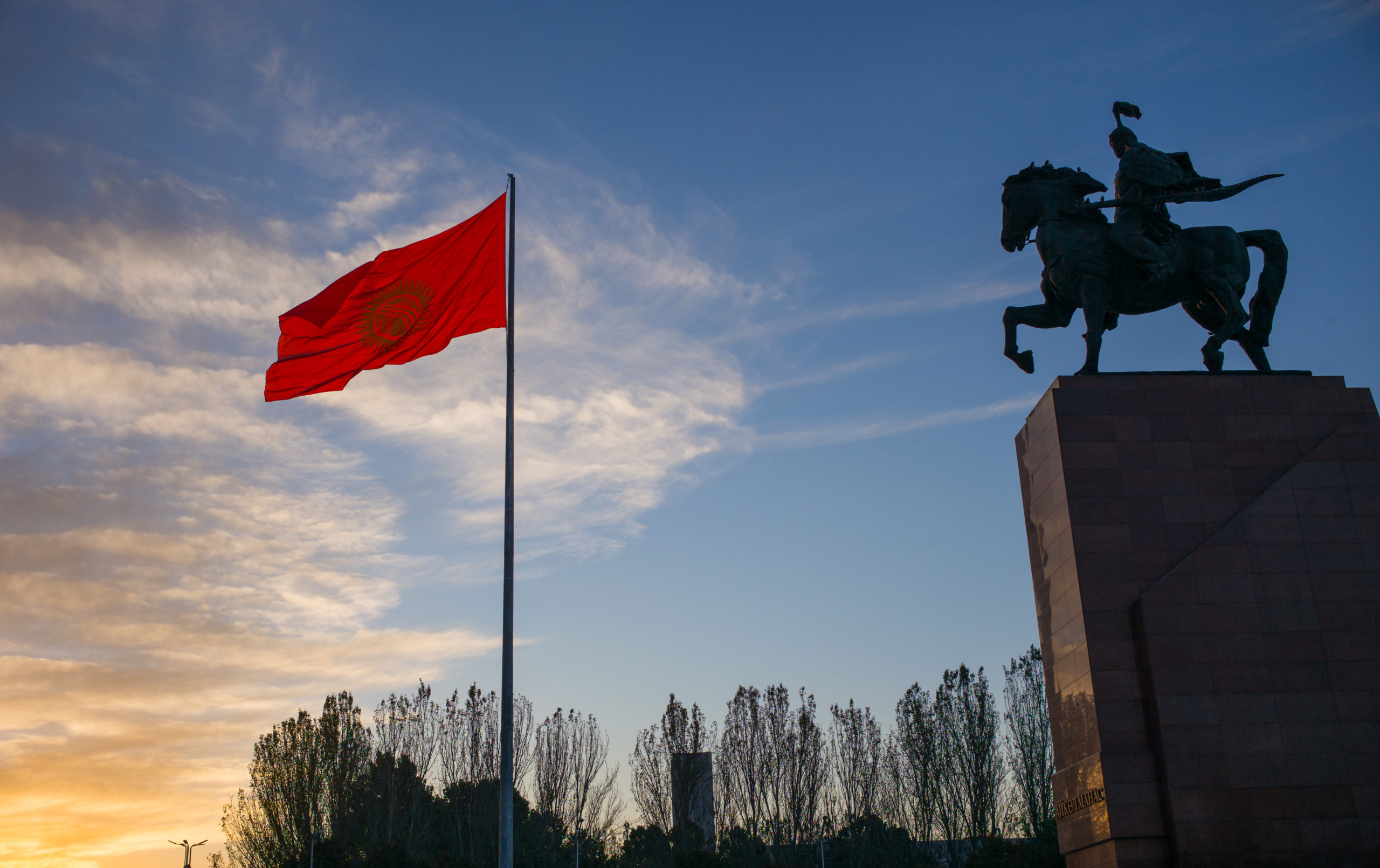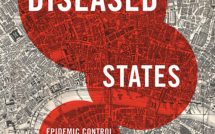

This is part of a roundtable on the EU Neighborhood.
The parliamentary elections organized in Kyrgyzstan on October 4, 2020, brought a new wave of social unrest and instability in the Central Asian republic labelled by some scholars as the region’s “island of democracy.” Engaging sixteen parties in the political process, the latest elections for the Jogorku Kenesh, Kyrgyzstan’s one chamber parliament, represented a rare manifestation of political competition in Central Asia. Nonetheless, the unexpected developments started the day after the preliminary results were published took an unprecedented scale for the last ten years, leading to major power shifts in the country’s domestic politics.
Even though regarded by some scholars as “the neighbors of Europe’s neighbors,”[1] the political evolutions in Kyrgyzstan, as well as in Central Asia generally, hold a great relevance for the European Union. Their importance comes in the light of Brussels’ commitment as one of the leading promoters of democracy around the world.[2] EU’s engagement towards democracy promotion can be explained through its formation as a political community based on liberal values such as democratic governance, rule of law and respect for human rights.
Additionally, the EU holds a special focus on Central Asia, which has been expressed through the two Strategies developed towards the region, but also through other political documents issued since 1991. Among the factors that account for the region’s importance for Brussels, there is the potential access to its energy resources, the trade perspectives by increasing interconnectivity and the prevention of instability and potential security risks spilling over to Europe. The importance of preserving regional stability became especially relevant after 2001, due to Central Asia’s adjacency to Afghanistan. On the background of the US-led “war on terror,” following the 9/11 terrorist attacks, Central Asia became more important also for the United States, due to the region’s strategic location for the operations in Afghanistan. In this context, given EU’s engagement in democracy promotion, and Kyrgyzstan’s democratic tendencies unique in its region, any forms of political or social instability, but also authoritarian drifts (should) represent matters of concern for the EU.
Background
Kyrgyzstan’s democratic leanings, unique in Central Asia, have been paired with a darker side of instability and social unrest episodes, which marked its post-independence history. In 2005, the protests which became known as the Tulip Revolution, put an end to Askar Akayev’s fifteen years presidency, under accusations of corruption and power concentration.[3] While the 2005 revolution was bloodless, the 2010 revolution—also known as the Melon Revolution—was marked by the violent repression of the protests by the Kyrgyz authorities, under the rule of president Kurmanbek Bakiyev (elected in 2005). As the April Revolution of 2010 grew, under similar corruption and authoritarianism accusations, Bakiyev fled to Belarus. Nonetheless, in May 2010 the social unrest exacerbated in the Osh region in Southern Kyrgyzstan, turning into an ethnic violence between Uzbeks and Kyrgyz, in which between 400 and 1000 people lost their lives.[4]
The aftermath of the 2010 April Revolution witnessed a constitution overhaul, through which the interim government aimed at preventing further authoritarian drifts of the future presidents. Thus, through consultations with the civil society, the 2010 constitution gave more power to the parliament, switching from a presidential towards a parliamentary system, and maintaining a “unique system of checks and balances.” As the constitution went through revisions in the following years, the subsequent elections stemmed a relatively competitive political process.[5]
New democratic struggles in Kyrgyzstan
Of the sixteen parties that competed for the 120 places in the parliament, only four managed to cross the 7 percent threshold, according to the preliminary results published on October 5. The main winners were Birimdik (Union) Party and the Mekenim (My Homeland) Kyrgyzstan Party, followed by the Kyrgyzstan Party and the Butun Kyrgyzstan. Among the parties which didn’t win any seats in the parliament were Reforma, the Social Democrats and Ata-Meken, the latter being one of the largest opposition parties.[6] The October 4 elections showed how fragmented the political landscape of Kyrgyzstan can be, by bringing in competition a large number of parties, relative to the country’s rather small population of around six million people. At the same time, through the small number of winners, the elections showed how little representative the legislative would have been.
The first three parties to enter the parliament were considered to be supportive of the political establishment. Moreover, Birimdik party is regarded as being closely tied to the now-resigned president Sooronbai Jeenbekov, while Mekenim has strong ties with Raimbek Matraimov, a former customs official accused of being involved in major smuggling schemes. Butun Kyrgyzstan is regarded as the only opposition party to have won seats in this election.[7]
In this context, representatives and supporters of several opposition parties, which didn’t manage to pass the threshold, gathered on October 5 in the central Ala-Too square of Bishkek, to protest against what they regarded to be widespread electoral fraud, and to demand the repeat of the vote. The protesters accused the parties of extensive use of administrative resources in favor of the main winners of the elections, vote buying and large voter migration.[8] The issue of vote buying was confirmed also by an OSCE report following a limited monitoring mission.[9]
Although started peacefully, the protests turned violent during the evening, continuing during the night, with some groups of protesters clashing with the police, taking control of the White House, (the building which hosts the Parliament and the President’s Office), but also of the government and security services’ buildings. In this context, several political figures were freed by protesters, among which the most notable were the former president Almazbek Atambayev, arrested in August 2019 over charges of corruption, and Sadyr Japarov, former member of the parliament, sentenced in 2013 over kidnapping charges. At the same time, a power vacuum was taking over the country, as president Sooronbai Jeenbekov’s whereabouts were unknown, losing much of his authority, while political opposition forces each claiming the reins of power. Moreover, across the country, several mines have stopped their activity under the pressures of the locals, and others have been attacked. Nonetheless, in Bishkek, “self-defense units” (known locally as druzhinniki), created at the initiative of the civil society, ensured the protection of local businesses and properties from looting. Despite the power vacuum and the social unrest, on October 6, the Central Election Commission (CEC) annulled the election results.[10]
The developments of the following days saw the emergence towards power of Sadyr Japarov, on the backdrop of clashes between his supporters, other opposition parties and supporters of former president Atambaev, but also through intimidation and pressure on members of the parliament reluctant on validating him.[11] Thus, on October 10, Japarov was voted as prime minister and, a few days later, he declared himself acting president, following the resignation on October 15 of Jeenbekov,[12] who thus became the third Kyrgyz president leaving his position in a context of social unrest.
The subsequent political evolutions witnessed the proposal of a new constitution, which is believed to be supported by Japarov. Labelled by critics as a “Khanstitution,” its reforms are considered to limit rights and liberties, but also to ease the concentration of power in the hands of a strong leader, thus turning Kyrgyzstan towards authoritarianism. The new constitution is to be approved in a referendum scheduled for January 10, 2021, at the same date with the presidential elections. Japarov, who in November resigned (to be eligible as candidate in the next presidential elections), is expected to benefit of the new provisions, since he is regarded as having the highest chances of becoming president. Protests of opposition against the new constitution have already taken place.[13]
The reaction of the EU
Even though Kyrgyzstan’s internal turmoil didn’t go unnoticed in Brussels, EU’s first reaction appeared to be rather reserved and over-cautious. Being issued through the spokesperson of the European External Action Service, one of EU’s first statements came in the context of the invalidation of the election results by the CEC, calling for a peaceful resolution of the internal political tensions, expressing expectations for a better organization of new elections and reiterating EU’s support for democracy.[14]
A bolder reaction from the EU came at a different level of authority, from the HR/VP Josep Borrell, following Jeenbekov’s resignation. Brussels expressed its doubts regarding the legitimacy of the transition of power towards Japarov, and underlined the parliamentary nature of Kyrgyzstan’s system of government.[15] Thus, the EU emphasized its support for the current status-quo, which can be regarded as an opposition to Japarov’s expressed intentions to return to a presidential system.[16]
In line with this position, the EU also postponed a payment of 6 million euro to Kyrgyzstan, until the parliamentary elections will be redone.[17] This action can be regarded as a lack of confidence of the EU in the legitimacy of the current political establishment from Bishkek. By postponing the assistance, the EU may aim to avoid offering external legitimacy for the rule of Japarov in Kyrgyzstan. Moreover, its delay can be regarded also as a form of pressure or conditionality towards resuming a legitimate political process from within.
EU’s reactions came on the background of its relatively strong interest towards Central Asia, which has been expressed, during the past two decades, primarily through the European Union’s Strategy for Central Asia, launched in 2007 and updated in 2019. Among other provisions, both Strategies emphasized the promotion of democracy and the rule of law, as well as the support for the protection of human rights in the states of the region.[18] Kyrgyzstan particularly benefits of a favorable relation with the EU, in the light of its unique democratic tendencies in Central Asia. Among other treaties, in 1999, Bishkek engaged in a Partnership and Cooperation Agreement with the EU, which had been upgraded, in 2019, to an Enhanced Partnership and Cooperation Agreement. Since 2016, Kyrgyzstan takes part in the GSP+ programme, benefiting from a favorable trade scheme, in return for a series of commitments towards respecting human rights. Also, for the 2014-2020 timeframe, Brussels allocated 174 million euro for Kyrgyzstan as bilateral aid, thus maintaining its position as one of its main donors.[19]
On the basis of Kyrgyzstan’s recent domestic evolutions, a possible development of EU’s approach towards Bishkek might be a continuation of the reluctance to cooperate with the new authorities associated with Japarov. While harsh sanctions seem unlikely, potential further conditionalities, as well as public statements may be in sight, with the aim of fostering an internal legitimate political process. Such a scenario would be in line with EU’s engagement as a leading democracy promoter at global level and with its political engagement at the level of the region. Moreover, given EU’s interests in Central Asia, as well as the relevance of the latter’s stability, Brussels’ focus towards democracy promotion in the region becomes even more relevant. On the other side, refraining from reacting towards authoritarian drifts would ease the involvement in Central Asia of the adjacent great powers Russia and China, and would not only represent a legitimization towards such regimes, but would also erode EU’s image as a leading democracy promoter.
Furthermore, there can be identified multiple arguments which encourage a firmer position of the EU against any authoritarian drifts in Kyrgyzstan. Firstly, through its democratic tendencies and the evolution of the past years, with the support of the EU, Bishkek came to be regarded as a valuable, even though faulty, outpost for democracy in Central Asia. Ceding in the face of Japarov’s power grab would mean losing years of investments and hard-won progress towards democracy. Secondly, the importance of preserving (and enhancing) Kyrgyzstan’s unique democratic leanings is doubled also by its potential to become a model for the other states in the region. Maintaining a democratic track would be especially relevant in the light of the near parliamentary elections in Kazakhstan.
However, there are also certain hindrances which prevent a tougher reaction from the EU. Brussels may be perceived as a “foreign agent” by Japarov and the authorities associated with him. On the one side, Japarov, a known nationalist, may be reluctant to any recommendation from the EU, which can be perceived as a meddling in Kyrgyzstan’s internal affairs (in a similar line with Russia’s “sovereign democracy” narrative). On the other side, the EU had already expressed its support for the parliamentary system, thus coming in opposition to Japarov’s plans regarding a presidential system switch. These issues may become highly relevant in the likely scenario in which Japarov wins the January 10 presidential elections. In this setting, EU’s caution towards a firm condemnation (or sanctions) can be explained by its desire to avoid distancing Kyrgyzstan, irrespective of its future leadership, and to maintain a channel open towards dialogue. In this case, Brussels would still maintain a certain leverage upon Bishkek.
Additionally, despite the geopolitical or security considerations in favor of EU’s active normative involvement towards Kyrgyzstan and Central Asia generally, there is also another, rather moral, issue at stake regarding the further conditionalities which could be enforced by Brussels. While such pressures could be triggered by the Kyrgyz political establishment’s neglect for its commitments towards reform and democratic norms, they ultimately impact the population. Thus, the citizens would end up suffering twice: first due to the negative effects of the authoritarian drifts of their leadership, and second due to the subsequent sanctions from the EU. In order to avoid such an outcome, the EU should engage in offering aid for the civil society, while bypassing a legitimization for the political establishment. Thus, Brussels can adopt a “bottom-up” approach towards democracy promotion, by supporting the grassroots activities of the civil society, which would become stronger in checking the actions of their political leadership.
Finally, the EU should adopt a more active position towards supporting democratic efforts in Kyrgyzstan, in order to meet the expectations regarding its leading role in democracy promotion at global level. A decline in the relative power of the EU MS, as well as EU’s internal divisions represented some of the factors which determined a defensive approach from the EU in the international environment during the last period, thus triggering a retreat from its normative commitment towards liberal values.[20] Nevertheless, only by following a normative foreign policy, based on the support for the liberal values of democracy and human rights, which are also the bedrock of its foundation, the EU can maintain its relevant role in the international arena. The current situation in Kyrgyzstan is one of the cases in which the EU has the opportunity to implement such a foreign policy, in order to reaffirm its role as a global promoter of democracy.
Ioan-David Onel is a PhD candidate in Political Science/International Relations at the National University of Political Science and Public Administration (SNSPA) in Bucharest, Romania. His research interests include the regional politics in Central Asia, but also in the wider Eastern Europe, the great powers’ competition, and the politics of democracy promotion. He also holds a MA in Security and Diplomacy at SNSPA.
This analysis was written before the January 10, 2021 Presidential elections and Constitutional referendum, thus not addressing the implications of their results.
References:
24 KG. “Выделение Европейским союзом 6 миллионов евро на цифровизацию отложено [European Union allocation of 6 million euros for digitalization postponed].” 24.kg. (2020). Accessed November 17, 2020: https://24.kg/obschestvo/170919_vyidelenie_evropeyskim_soyuzom_6millionov_evro_natsifrovizatsiyu_otlojeno/
Al Jazeera. “Sadyr Japarov: Kyrgyzstan needs to change ‘political culture’.” Al Jazeera. (2020). Accessed November 17, 2020: https://www.aljazeera.com/program/talk-to-al-jazeera/2020/10/20/sadyr-japarov-kyrgyzstan-needs-to-change-political-culture/
Cornell, Svante and Frederick Starr. “A Steady Hand: The EU 2019 Strategy & Policy Toward Central Asia.” Washington: Central Asia-Caucasus Institute & Silk Road Studies Program. (2019). Accessed November 26, 2020: https://isdp.eu/content/uploads/2019/11/EU-Central-Asia-25.11.19-Print-V-wCover.pdf
Dzamukashvili, Soso and Eter Glurjidze. “Kyrgyzstan in a Political Vortex: When Two Revolutions are “Not Enough”.” Rondeli Foundation. (2020). Accessed November 26, 2020: https://www.gfsis.org/blog/view/1111
EEAS. “Kyrgyz Republic: Statement by the High Representative/Vice-President Josep Borrell.” European Union External Action Service. (2020). Accessed November 17, 2020: https://eeas.europa.eu/headquarters/headquarters-homepage/87065/kyrgyz-republic-statement-high-representativevice-president-josep-borrell_en
EEAS. “Kyrgyz Republic: Statement by the Spokesperson on the parliamentary elections.” European Union External Action Service. (2020). Accessed November 17, 2020: https://eeas.europa.eu/headquarters/headquarters-homepage/86426/kyrgyz-republic-statement-spokesperson-parliamentary-elections_en
European Commission. “Communication From The Commission To The Council And The European Parliament On Strengthening The European Neighbourhood Policy.” Brussels. (2006). Accessed December 4, 2020: https://eur-lex.europa.eu/LexUriServ/LexUriServ.do?uri=COM:2006:0726:FIN:EN:PDF
European Council/Council of the European Union. “EU-Kyrgyzstan Cooperation Council. 9 December 2019.” (2019). Accessed November 26, 2020: https://www.consilium.europa.eu/en/meetings/international-ministerial-meetings/2019/12/09/
European Union External Action Service. “EU-KYRGYZ REPUBLIC RELATIONS.” (2018). Accessed November 26, 2020: https://eeas.europa.eu/sites/eeas/files/2.factsheet_on_eu-kyrgyz_republic_relations.nov_.18.pdf
France 24. “Kyrgyz protest over proposed constitution empowering president.” France24. (2020). Accessed November 26, 2020: https://www.france24.com/en/live-news/20201122-kyrgyz-protest-over-proposed-constitution-empowering-president?fbclid=IwAR1YryUiG9JwBIh9sRDfRSdNKc9T-DHeulAcjBg2Z4p82Zeh_E59o6A8ia8
Imanaliyeva, Ayzirek and Peter Leonard. “Kyrgyzstan: Police and protesters clash in post-election mêlée.” Eurasianet. (2020). Accessed November 17, 2020: https://eurasianet.org/kyrgyzstan-police-and-protesters-clash-in-post-election-melee
Imanaliyeva, Ayzirek. “Kyrgyzstan: In an uprising low on heroes, defense volunteers shine.” Eurasianet. (2020). Accessed November 26, 2020: https://eurasianet.org/kyrgyzstan-in-an-uprising-low-on-heroes-defense-volunteers-shine
Lehne, Stefan. “Securing the EU’s Place in the World.” Carnegie Europe. (2020). Accessed December 5, 2020: https://carnegieeurope.eu/2020/11/17/securing-eu-s-place-in-world-pub-83246
Leonard, Peter and Ayzirek Imanaliyeva. “Kyrgyzstan: Competitive elections turn into rout for status quo.” Eurasianet. (2020). Accessed November 17, 2020: https://eurasianet.org/kyrgyzstan-competitive-elections-turn-into-rout-for-status-quo
Leonard, Peter. “As dawn breaks in Kyrgyzstan, protesters control government buildings.” Eurasinet. (2020). Accessed November 17, 2020: https://eurasianet.org/as-dawn-breaks-in-kyrgyzstan-protesters-control-government-buildings
Leonard, Peter. “Kyrgyzstan: Japarov seizes all levers of power.” Eurasianet. (2020). Accessed November 17, 2020: https://eurasianet.org/kyrgyzstan-japarov-seizes-all-levers-of-power
Marat, Erica. “Commentary: Kyrgyzstan’s Elections — The Best It Gets In Central Asia.” Radio Free Europe/Radio Liberty. (2015). Accessed November 26, 2020: https://www.rferl.org/a/kyrgyzstan-elections-best-it-gets-in-central-asia/27283649.html
OSCE. “Kyrgyz Republic – Parliamentary Elections, 4 October 2020 – STATEMENT OF PRELIMINARY FINDINGS AND CONCLUSIONS.” OSCE – Office for Democratic Institutions and Human Rights. (2020). Accessed November 17, 2020: https://www.osce.org/files/f/documents/b/6/465735.pdf
Putz, Catherine. “Remembering Kyrgyzstan’s Revolutions.” The Diplomat. (2015). Accessed November 26, 2020: https://thediplomat.com/2015/04/remembering-kyrgyzstans-revolutions/
RFE/RL’s Kyrgyz Service. “Kyrgyzstan Annuls Results Of Parliamentary Elections After Night Of Deadly Protests.” Radio Free Europe/Radio Liberty. (2020). Accessed November 17, 2020: https://www.rferl.org/a/building-housing-kyrgyz-parliament-president-s-office-catches-fire-after-day-of-protests/30877477.html
RFE/RL’s Kyrgyz Service; OCCRP and Kloop. “Plunder And Patronage In The Heart Of Central Asia.” Radio Free Europe/Radio Liberty. (2019). Accessed November 26, 2020: https://www.rferl.org/a/30284703.html
Turgunbaeva, Aigerim. “Kyrgyzstan’s Messy Parliamentary Election Sparks Protests in Bishkek.” The Diplomat. (2020). Accessed November 26, 2020: https://thediplomat.com/2020/10/kyrgyzstans-messy-parliamentary-election-sparks-protests-in-bishkek/
Zamfir, Ionel and Alina Dobreva. “EU support for democracy and peace in the world.” European Parliament. (2019). Accessed November 26, 2020: https://www.europarl.europa.eu/RegData/etudes/BRIE/2018/628271/EPRS_BRI(2018)628271_EN.pdf
Медиазона [Mediazona]. “Садыр Жапаров объявил себя и.о. президента Кыргызстана [Sadyr Japarov declared himself acting president of Kyrgyzstan].” Медиазона Центральная Азия [Mediazona Central Asia]. (2020). Accessed November 17, 2020: https://mediazona.ca/news/2020/10/15/zhaparov
Радио Азаттык [Radio Azattyk]. “В Джалал-Абадской области на руднике Иштамберди произошел пожар [Fire breaks out at the Ishtamberdi mine in Jalal-Abad region].” Radio Free Europe/Radio Liberty. (2020). Accessed November 26, 2020: https://rus.azattyk.org/a/30900949.html
[1] Term first used by the European Commission, in the context of the European Neighborhood Policy, in reference to several regions among which also Central Asia (European Commission, “Communication From The Commission To The Council And The European Parliament On Strengthening The European Neighbourhood Policy,” Brussels, (2006). Accessed December 4, 2020: https://eur-lex.europa.eu/LexUriServ/LexUriServ.do?uri=COM:2006:0726:FIN:EN:PDF)
[2] Ionel Zamfir and Alina Dobreva, “EU support for democracy and peace in the world,” European Parliament, (2019). Accessed November 26, 2020: https://www.europarl.europa.eu/RegData/etudes/BRIE/2018/628271/EPRS_BRI(2018)628271_EN.pdf
[3] Soso Dzamukashvili and Eter Glurjidze, “Kyrgyzstan in a Political Vortex: When Two Revolutions are “Not Enough”,” Rondeli Foundation, (2020). Accessed November 26, 2020: https://www.gfsis.org/blog/view/1111
[4] Catherine Putz, “Remembering Kyrgyzstan’s Revolutions,” The Diplomat, (2015). Accessed November 26, 2020: https://thediplomat.com/2015/04/remembering-kyrgyzstans-revolutions/
[5] Erica Marat, “Commentary: Kyrgyzstan’s Elections — The Best It Gets In Central Asia,” Radio Free Europe/Radio Liberty, (2015). Accessed November 26, 2020: https://www.rferl.org/a/kyrgyzstan-elections-best-it-gets-in-central-asia/27283649.html
[6] Aigerim Turgunbaeva, “Kyrgyzstan’s Messy Parliamentary Election Sparks Protests in Bishkek,” The Diplomat, (2020). Accessed November 26, 2020: https://thediplomat.com/2020/10/kyrgyzstans-messy-parliamentary-election-sparks-protests-in-bishkek/; RFE/RL’s Kyrgyz Service, “Kyrgyzstan Annuls Results Of Parliamentary Elections After Night Of Deadly Protests,” Radio Free Europe/Radio Liberty. (2020). Accessed November 17, 2020: https://www.rferl.org/a/building-housing-kyrgyz-parliament-president-s-office-catches-fire-after-day-of-protests/30877477.html.
[7] Ayzirek Imanaliyeva and Peter Leonard, “Kyrgyzstan: Police and protesters clash in post-election mêlée,” Eurasianet. (2020). Accessed November 17, 2020: https://eurasianet.org/kyrgyzstan-police-and-protesters-clash-in-post-election-melee; RFE/RL’s Kyrgyz Service; OCCRP and Kloop, “Plunder And Patronage In The Heart Of Central Asia,” Radio Free Europe/Radio Liberty. (2019). Accessed November 26, 2020: https://www.rferl.org/a/30284703.html
[8] Peter Leonard and Ayzirek Imanaliyeva, “Kyrgyzstan: Competitive elections turn into rout for status quo,” Eurasianet. (2020). Accessed November 17, 2020: https://eurasianet.org/kyrgyzstan-competitive-elections-turn-into-rout-for-status-quo
[9] OSCE, “Kyrgyz Republic – Parliamentary Elections, 4 October 2020 – STATEMENT OF PRELIMINARY FINDINGS AND CONCLUSIONS,” OSCE – Office for Democratic Institutions and Human Rights. (2020). Accessed November 17, 2020: https://www.osce.org/files/f/documents/b/6/465735.pdf
[10] Ayzirek Imanaliyeva, “Kyrgyzstan: In an uprising low on heroes, defense volunteers shine,” Eurasianet, (2020). Accessed November 26, 2020: https://eurasianet.org/kyrgyzstan-in-an-uprising-low-on-heroes-defense-volunteers-shine; Радио Азаттык [Radio Azattyk], “В Джалал-Абадскойобласти на руднике Иштамберди произошел пожар [Fire breaks out at the Ishtamberdi mine in Jalal-Abad region],” Radio Free Europe/Radio Liberty, (2020). Accessed November 26, 2020: https://rus.azattyk.org/a/30900949.html; Peter Leonard, “As dawn breaks in Kyrgyzstan, protesters control government buildings,” Eurasinet. (2020). Accessed November 17, 2020: https://eurasianet.org/as-dawn-breaks-in-kyrgyzstan-protesters-control-government-buildings; RFE/RL’s Kyrgyz Service, “Kyrgyzstan Annuls Results Of Parliamentary Elections After Night Of Deadly Protests,” Radio Free Europe/Radio Liberty. (2020). Accessed November 17, 2020: https://www.rferl.org/a/building-housing-kyrgyz-parliament-president-s-office-catches-fire-after-day-of-protests/30877477.html
[11] Peter Leonard, “Kyrgyzstan: Japarov seizes all levers of power,” Eurasianet. (2020). Accessed November 17, 2020: https://eurasianet.org/kyrgyzstan-japarov-seizes-all-levers-of-power
[12] Медиазона [Mediazona], “Садыр Жапаров объявил себя и.о. президента Кыргызстана [Sadyr Japarov declared himself acting president of Kyrgyzstan],” Медиазона Центральная Азия [Mediazona Central Asia]. (2020). Accessed November 17, 2020: https://mediazona.ca/news/2020/10/15/zhaparov
[13] France 24, “Kyrgyz protest over proposed constitution empowering president,” France24. (2020). Accessed November 26, 2020: https://www.france24.com/en/live-news/20201122-kyrgyz-protest-over-proposed-constitution-empowering-president?fbclid=IwAR1YryUiG9JwBIh9sRDfRSdNKc9T-DHeulAcjBg2Z4p82Zeh_E59o6A8ia8
[14] EEAS, “Kyrgyz Republic: Statement by the Spokesperson on the parliamentary elections,” European Union External Action Service. (2020). Accessed November 17, 2020: https://eeas.europa.eu/headquarters/headquarters-homepage/86426/kyrgyz-republic-statement-spokesperson-parliamentary-elections_en
[15] EEAS, “Kyrgyz Republic: Statement by the High Representative/Vice-President Josep Borrell,” European Union External Action Service. (2020). Accessed November 17, 2020: https://eeas.europa.eu/headquarters/headquarters-homepage/87065/kyrgyz-republic-statement-high-representativevice-president-josep-borrell_en
[16] Al Jazeera, “Sadyr Japarov: Kyrgyzstan needs to change ‘political culture’,” Al Jazeera. (2020). Accessed November 17, 2020: https://www.aljazeera.com/program/talk-to-al-jazeera/2020/10/20/sadyr-japarov-kyrgyzstan-needs-to-change-political-culture/
[17]24 KG, “Выделение Европейским союзом 6 миллионов евро на цифровизацию отложено [European Union allocation of 6 million euros for digitalization postponed],” 24.kg. (2020). Accessed November 17, 2020: https://24.kg/obschestvo/170919_vyidelenie_evropeyskim_soyuzom_6millionov_evro_natsifrovizatsiyu_otlojeno/
[18] Svante Cornell and Frederick Starr, “A Steady Hand: The EU 2019 Strategy & Policy Toward Central Asia,” Washington: Central Asia-Caucasus Institute & Silk Road Studies Program, (2019). Accessed November 26, 2020: https://isdp.eu/content/uploads/2019/11/EU-Central-Asia-25.11.19-Print-V-wCover.pdf
[19] European Council/Council of the European Union, “EU-Kyrgyzstan Cooperation Council, 9 December 2019,” (2019). Accessed November 26, 2020: https://www.consilium.europa.eu/en/meetings/international-ministerial-meetings/2019/12/09/; European Union External Action Service, “EU-KYRGYZ REPUBLIC RELATIONS,” (2018). Accessed November 26, 2020: https://eeas.europa.eu/sites/eeas/files/2.factsheet_on_eu-kyrgyz_republic_relations.nov_.18.pdf
[20] Stefan Lehne, “Securing the EU’s Place in the World,” Carnegie Europe, (2020). Accessed December 5, 2020: https://carnegieeurope.eu/2020/11/17/securing-eu-s-place-in-world-pub-83246
Photo: Bishkek, Kyrgyzstan: Monument for Manas, hero of ancient kyrgyz epos, together with national Kyrgyzstan flag on Bishkek central Ala-Too square
Published February 9, 2021.




